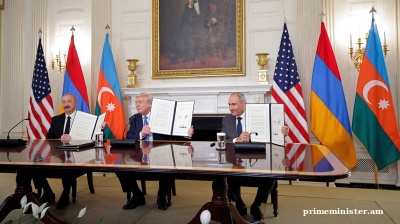The EU and the US promised over $356 million in fresh assistance to Armenia during a meeting between Armenian Prime Minister Nikol Pashinyan, Secretary of State of the United States Antony Blinken and President of the European Commission Ursula Von Der Leyen.
"We aim to expand cooperation to strengthen Armenia's resilience, including in key sectors such as political reforms, economic development and humanitarian support. We will look to expand our partnerships, for example, in mobility, governance, law enforcement, trade, connectivity, agriculture, energy, and technology," the joint statement issued following the meeting read.
The promised funds include $270 million from the EU and over $65 million from the United States.
The meeting was met with a cold welcome in Baku and Moscow.
"We regard the high-level meeting in the Armenia-U.S.-EU format in Brussels on April 5, 2024, as another attempt by the 'collective West' to involve the South Caucasus in geopolitical confrontation," a Russian Foreign Ministry statement said.
The talks come as Armenia seeks new alliances in the West following the rapid deterioration of relations with its former closest ally, Russia. The EU has also suggested supporting Armenia with ‘non-lethal’ weapons through the European Peace Facility. Currently, the EU has over 100 observers in Armenia, monitoring the situation on the Armenia-Azerbaijan border.
The increasing engagement of the EU in the region also angered Baku, which has repeatedly blamed the EU mission for allegedly not assisting in the resolution of the conflict between Armenia and Azerbaijan. The criticism towards the EU sparked once again before the meeting. In a statement, Azerbaijani Foreign Ministry spokesman Aykhan Hajizada criticised the meeting, arguing that it "creates new dividing lines and so-called spheres of influence in the region instead of encouraging the Armenian side to negotiate in good faith". Hajizada also pointed the finger at France for "militarising" Armenia and Greece for deepening military cooperation with the country.
The EU, however, was quick to respond to the criticism, with Peter Stano, the chief spokesman for foreign and security policy, stepping in to clarify the agenda. Stano insisted: "It is not true that the planned trilateral meeting between the EU, the US and Armenia on 5 April will focus on 'security guarantees'. He added: "A strictly bilateral focus will be on Armenia's economic resilience and bilateral cooperation with this country".
"A stable and more resilient Armenia means a more stable South Caucasus," Stano said. "Our efforts are not directed against anyone and are in the interest of the whole region and its stability."
Following the backlash from Azerbaijan, Blinken and von Der Leyen called Azerbaijani President Ilham Aliyev to discuss the situation in the region and the partnership with Azerbaijan.
As the meeting and its results are being discussed, the tensions on the Armenia-Azerbaijan border increased again, with the sides accusing each other of ceasefire violations. The Armenian Ministry of Defence and Interior Ministry mentioned damage to civilian infrastructure, namely, several houses and gravestones due to the Azerbaijani shooting.
News

Mali blockade deepens as jihadists choke vital trade routes
Mali’s junta has sought to reassure citizens after Islamist militants tightened a blockade on highways feeding the capital, torching lorries and kidnapping foreign drivers in a campaign analysts warn could strangle the economy.

Flydubai launches twice-weekly service to Moldova's capital
Flydubai becomes first UAE carrier to serve Moldova with twice-weekly Chișinău flights from Dubai, expanding European network with connections to underserved destinations.

Nigeria clears $18.2bn in oil and gas field development plans to lift output
The $18.2bn worth of approvals mark among the largest investment commitments in Nigeria's O&G sector since the 2021 Petroleum Industry Act (PIA) was adopted, underpinning the target to raise crude capacity above 3mn bpd.

Kazakhstan bolsters rapid response capabilities to potential security threats
Ministry of Emergency Situations to take lead in organising territorial defence.




